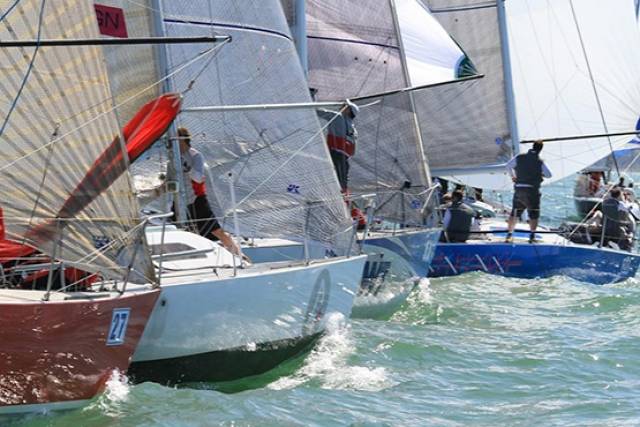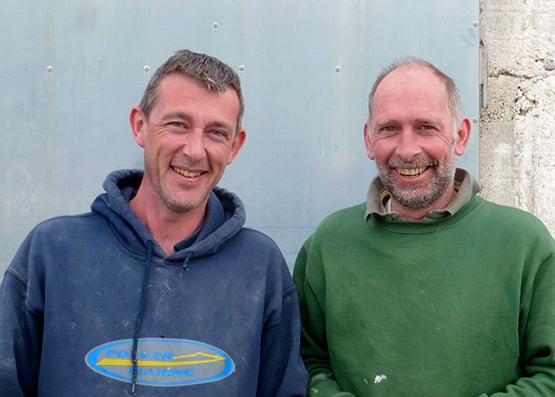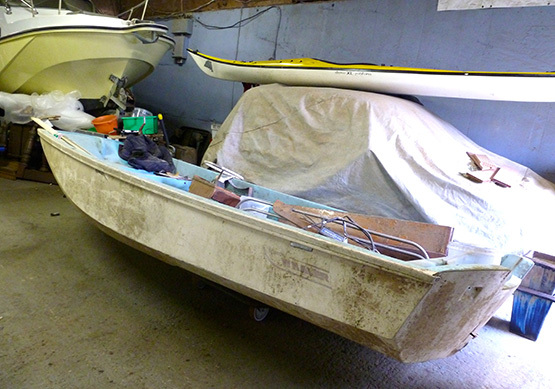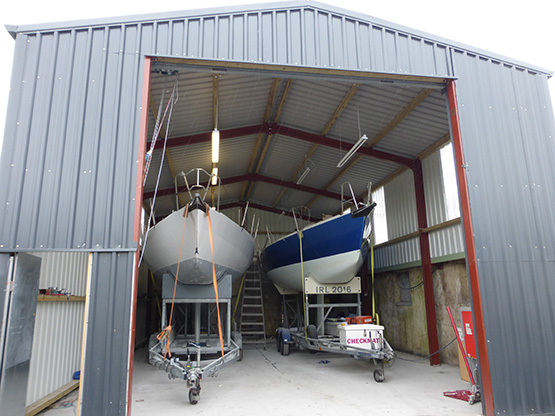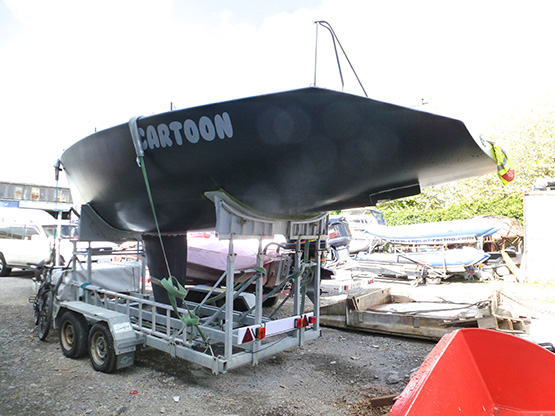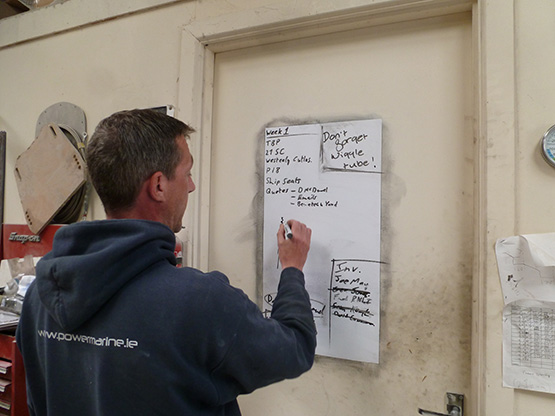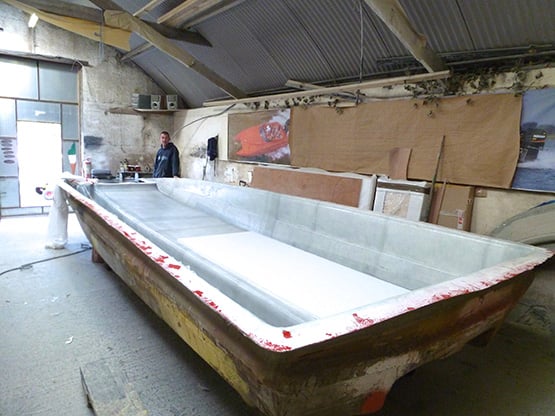The attraction of boats and the sea as a year-round fascination is something which by-passes many people. And even in summer – particularly if it’s a typical Irish summer – you’d sometimes be hard put to explain the appeal of our eccentric sport in its multiple manifestations to those who were only taking a polite interest in the first place. W M Nixon adds to the mystery by considering the unexpected interactions which come up on a typical day as the new season creaks into action.
“It’s an old Boston Whaler” says Grant McEwen, “a very old Boston Whaler. Long forgotten too, by the look of it. Most people would have thought it was fit only for the landfill site But the new owner wants it restored to best original order, proper Concours d’Elegance stuff. What do you think of that?”
“It’s absolutely marvellous” says I. “By my reckoning, the Boston Whaler in all its manifestations is classic. You just can’t do too much good work by a proper classic boat. Go for it!”
The men who work on boats in hidden workshops – Alan Power and Grant McEwen out the back of Malahide. Photo: W M Nixon
This tired-looking Boston Whaler may be as much as fifty years old, but with the proper restoration skills in Malahide she’ll be brought to Concours d’Elegance standards as a real classic. Photo: W M Nixon
We’re in one of those semi-secret little places where boat nuts gather. It’s a yard up the back of Malahide out the back of a small business park, a place where little one and two-man businesses - some of them in the marine industry - have clustered, because the reality of waterfront property in the Dublin area is that it has become much too expensive to provide decent premises for boat businesses operating on very tight margins.
Yet in these hidden and unassuming places, you’ll find some really amazing things going on. But they’re amazing only if you’re a dyed-in-the-wool boat enthusiast. So we’re not even talking about all sailing people here. Some sailing and boating people just don’t want to know about the hidden details of boats and their equipment, and how things came to be that way. They just want to go sailing, or zip around the sea under power. The work behind the scenes is not for them.
But for the rest of us, sailing and boating are of heightened interest because they’re vehicle sports. The vehicles themselves are every bit as interesting as the sport you can have with them. And from that, of course, there springs the notion that with a bit of change here and there - a minor tweak of this, and a minor adjustment of that – then hey presto, you’ve got a much improved boat.
As it happens, the finding of this Boston Whaler brought in for the Lazarus treatment was a fortuitously associated event, as I’d called to this secret yard in Malahide to shoot the breeze with one of Grant’s neighbours, Alan Power. He is known among the cognoscenti as the man to go to when you want your boat modified in interesting ways. He’s the kind of genius with epoxies and whatnot who will cheerfully take on a challenge which other workers around boats couldn’t even contemplate, let alone try.
Yet Alan will take on the job, and he has done so with such success in recent years that he has had an additional new shed built on the only spare bit of ground left in this secret yard, a shed big enough to accommodate two Half Tonners side by side.
“We’ve a World Champion out the back”. Re-vitalised Half Tonners The Big Picture (left) and World Champion Checkmate in Power Marine’s new shed in Malahide. Photo W M Nixon
Half Tonners are boats around the 30ft LOA mark which were all the rage as the hottest international level rating keelboat class around 30 years ago, when they were so highly-regarded that the likes of Olympic sailing legend Paul Elvstrom of Denmark got intensely involved. But this level of participation ultimately led to a sort of self-immolation of the class, even though the boats were still around, though now racing as ordinary handicap craft.
But as the years have passed, people have come to realize that the Half Tonner is a very manageable proposition as a classic, and thanks to modern construction, many examples of the great designs of the class’s golden years have survived remarkably well. All they need is a bit of TLC and maybe a bit of repair and tweaking here and there, and this is where Alan Power of Power Marine comes in, for no-one does it better.
The irony of it all is that Alan himself is a powerboat fanatic, both building and racing. Last weekend he was competing with the Irish contingent in the major international powerboat event at Torquay in Devon, Rounds 1 & 2 of the RYA British OCR (Offshore Racing Circuit) Championship. Roughly speaking, it’s the powerboat equivalent of saloon car racing, and this time round it was Alan’s brother Mark, navigated by Carl Kendellen, who showed best with a sixth in class and ninth overall. But in times past Alan has frequently been on the podium, and he has some Gold Medals to show for his efforts. So now that he has the new shed up and running, he has been able to devote his original shed to one of his personal pet projects, a very hungry looking powerboat to his own designs.
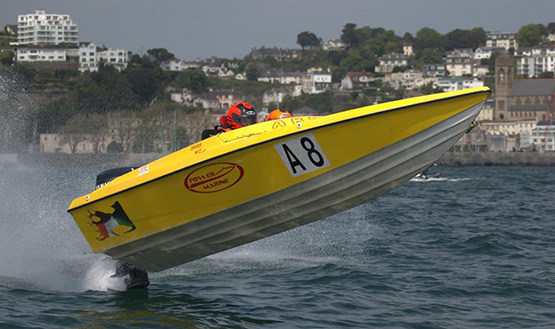
Mark Power’s boat was the most successful of the Irish contingent at last weekend’s Offshore Circuit Racing (ORC) event in Torquay in Devon
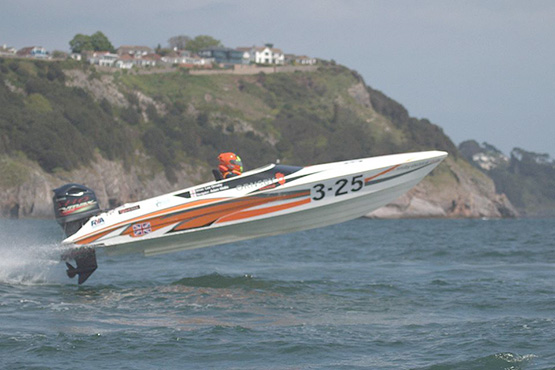
This British competitor at last weekend’s Torquay series was a successful Power Marine export order
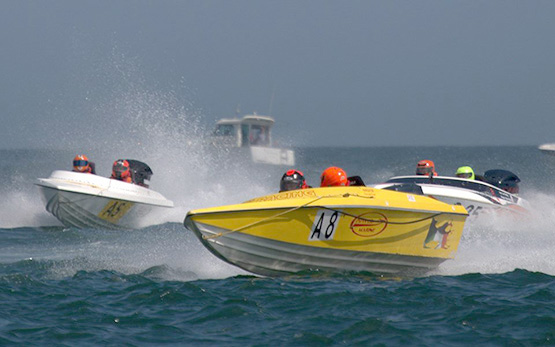
Powering ahead. Mark Power and Carl Kendellen find themselves in the sweet place in last weekend’s racing
It may seem odd that the development of a new prototype racing powerboat is in a sense being funded by the maintenance and modification requirements of handicap racing sailboats, but either way it’s specialist boat-building, and the skills are very transferable.
Fortunately, Alan hasn’t set himself too strict a deadline on this particular new craft, for with the economy picking up again, people are getting around to commissioning those modifications on sailboats that they’ve had in mind for some time, and as well there’s always a steady stream of repair work at Power Marine.
A month ago, the new shed was busy with two of the top Half Tonners in dock, Dave Cullen’s World Champion Classic half Tonner Checkmate XV and the Evans brothers’ The Big Picture. Checkmate is now afloat and competing, but The Big Picture is having further mods made, and meanwhile waiting outside is Ken Lawless’s handy little Quarter Tonner Cartoon, which is in the yard to get the Power treatment for her rudder.
Ken Lawless’s Quarter Tonner Cartoon in Power Marine for some fine tuning of the rudder
Once again, this is where boat nuts and ordinary sailors part company. For your ordinary sailor, a rudder is just a rudder. But for boat nuts, a rudder is a source of endless fascination, an item for almost eternal modification. What with creating the best-possible endplate effect at the hull, or reducing turbulence from the trailing edge, for your boat nut there’s not really a rudder on the planet which can’t be improved, however infinitesimally small the mods might be.
For non-enthusiasts, this might seem like something akin to debating how many angels can dance on the head of a pin, but I remained happily absorbed in a brief lecture by Alan – complete with sketches on a whiteboard – on the ideal configuration for the trailing edge of a rudder, which is not a knife edge as you’d expect, but is instead a small flat cutoff at about 45 degrees.
The artist in his studio – Alan Power sketching out the ideal trailing edge for a Quarter Tonner’s rudder. Photo: W M Nixon
The visit to Power Marine was prompted by a sunny Bob Bateman photo we had here on Afoat.ie a few days back of a Half Tonner swanning along in classic yachting style. This evoked contrasting memories of seeing Alan Power back in early April when work was going flat out on the two Half Tonners, and there was ample evidence of the dust-creating ability of an adult angle-grinder, with the man himself emerging from the back of the shed looking like something out of a horror movie. For sure, it’s wonderful to think of people sailing along in that healthy style as shown by the Bateman photo. But just now and again it does no harm to remember how much effort has to go into bringing a boat such as a vintage Half Tonner up to full racing potential.
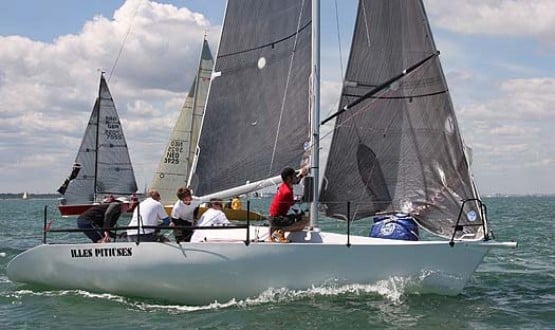
Champagne sailing. It was this idyllic image on Afloat.ie which prompted a visit to the dusty reality of a modern boatworking shed. Photo: Robert Bateman
Yet it would be pointless for all this effort to be put through in dusty premises unless the customers go out and sail and race the boat with the same dedication, and all credit to Dave Cullen, he does that very thing, and became our Sailor of the Month last August for trailing Checkmate XV to Belgium and winning the Half Ton Classics 2015.
He has an even busier season planned this year, as Checkmate has work to do at Dave’s home port of Howth in the ICRA Nationals from 10th to 12th June, but then a few days later he moves into a different scene with the complete charter of the Kelly family’s J/109 Storm, which becomes Euro Car Parks for the Volvo Round Ireland race on June 18th, crewed by five of the Checkmates plus Maurice Prof O’Connell - as the Checkmates who won the Half Ton Worlds make up a Who’s Who of Irish sailing talent, this is one potent challenge.
But Checkmate herself isn’t forgotten, for in August she has to defend her world title in Falmouth, which is as lovely a place to sail as you’ll find in a many a weeks voyaging. It’s all a very long way from a busy boatworking shed somewhere out the back of Malahide. But that’s the way it is with this crazy sport of ours.
Is it a bird? Is it a plane? Is it a bath……? No, it’s the mould for the new cathedral hull raceboat from Power Marine, which will be slightly similar to the red machine in the poster on the wall. Photo: W M Nixon



























